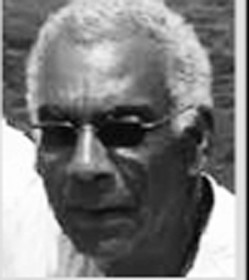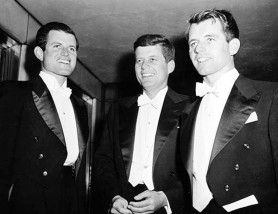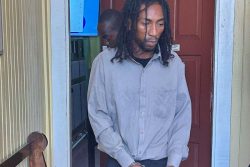In Our Time
Some time around midnight on July 18, 1969 (easy to remember the date, since it was my 25th birthday), on Chappaquiddick Island off Martha’s Vineyard, a ’67 Oldsmobile drove off the rail-less Dike Bridge, flipped and sank upside down in an inlet. The driver managed somehow to get out. His companion did not. The political ripples of that fatal accident changed history.

The driver was young, hard-drinking, hard-driving and womanizing Ted Kennedy, 37, married, and the last surviving son of Jo Kennedy, the Irish-Bostonian liquor tycoon with dynastic dreams. His companion was a young woman named Mary Jo Kopechne, a devout Christian, 28, and unmarried.
Kennedy later testified that, having got out, he’d dived back down “several times” in an attempt to extricate her. There’s no reason to disbelieve him; and if that had been all, the story might well have ended there. Car accidents happen all the time, and, even though it emerged that he had been drinking, no one could prove that Kennedy wasn’t, as he claimed, dropping Mary Jo from a reunion party they’d both attended to the ferry that would take her home.
But that wasn’t all. Instead of immediately calling medics or the police (there were houses with phones nearby), Kennedy walked back to the party, persuaded his men friends there not to tell the women what had happened, and then waited until 9 the following morning to report the accident. At the inquest he confessed that he hadn’t had “the moral strength” to call Mary Jo’s mother “at 2 in the morning and tell her that her daughter was dead.” But that was hardly the point.
If there’s a fundamental American vice, it’s an — often glaring — lack of empathy: a lack of imagination, really, that has always made it easy for Americans (as Melville knew) to see their ‘exceptionalist’ national destiny as one long struggle against ‘evil.’ And to Americans, evil has always been everywhere — from the redskins whose land they were stealing to the blacks whom they’d enslaved; from witches walking about the little town of Salem in the form of ordinary townsfolk to Japanese-Americans whom they interned during the Second World War; from Commies under the bed during the McCarthy witch hunts to ‘the yellow peril’ (the same China which today keeps the US dollar afloat); to, in our time, Muslims.
So, in the wake of Chappaquiddick, most Americans saw only the worst possible

interpretation of Ted Kennedy’s behaviour that night. This was that the ‘spoilt little rich boy,’ now a US Senator, had once again hoped to avoid the consequences of his actions, as he had done so often in the past (cheating at university, eg); that, with no thought for the young woman he had inadvertently killed, or for her family, he had spent the nine hours between the accident and his reporting of it trying to get the incriminating alcohol out of his breath. It emerged that, early the following morning, Kennedy had engaged in small talk about sailing with a local yachtsman and agreed to have breakfast with him; this, with the accident still unreported.
And all this may be true. But what it scants is what had to have been, by then, the thoroughly dread-ridden — indeed, semi-psychotic — psyche of Edward Kennedy.
The youngest of four sons in a wealthy, close and happy family, Ted had grown up with the family understanding that his idolized eldest brother, Jo Jr, would be president of the US one day, only to have his brother and that dream destroyed in the skies over England during World War II. After that, he was a kid member of Camelot, the name given to that short-lived explosion of American idealism and joyousness personified by his charismatic elder brother, President Kennedy, and JFK’s glamorous wife Jackie — only to watch his brother literally have his brains blown out by an allegedly nondescript assassin in Dallas, Texas. The trauma to America of JFK’s assassination persists in many quarters to this day. Imagine the trauma to JFK’s hero-worshipping kid brother.
Then, five years later, he, Ted, was campaign manager for his third brother’s run for the Democratic nomination (undertaken despite Jackie’s piteous imprecations that “They” would kill him too) when Bobby was likewise assassinated. By consensus, he, Bobby, had been the best of them: a man who had put aside his considerable fears for his own safety and been motivated to run purely by the injustice routinely handed out by America to its Native Americans, its blacks, and its poor. And there now was Bobby, murdered, too.
(It’s hard not to see Ted’s 1980 run against incumbent Jimmy Carter, likewise undertaken against the fervent wishes of his family, as a kind of Russian roulette, or a desperate putting of the question to those forces of darkness in the corridors of American power whom Jackie had referred to as “They” — for no Kennedy ever believed in the, twice-repeated, ‘Lone wacky gunman’ scenario of orthodox historians: ‘Kill me too now, or get thee forever behind me.’ That would certainly explain the lacklustre campaign he, Ted, ran.)
Finally, one of Ted’s sisters was killed in a plane crash, and another had a lobotomy and was institutionalized thereafter.
And now here he was, the last brother, unwilling inheritor of whatever was left of Camelot and head of that savagely winnowed clan: here he was, the ‘last Kennedy,’ bringing shame upon a dream as big as America itself, and heaping dishonour on the corpses of his two iconic dead brothers, whom he had loved more than he loved himself. How, in the immediate wake of Chappaquiddick, could he have been other than paralyzed? How could he not have felt his long nocturnal suspicion confirmed: that, for some reason indecipherable as the stars, he had been condemned to live a nightmare?
The story of the real Ted Kennedy begins after all that. It begins in fact with his 1980 concession speech (to Carter), a 45-minute peroration that is today considered one of the great speeches in American political history, that repeatedly moved its audience to cheers and tears, and that ended, memorably, “The work begins anew, the hope rises again, and the dream lives on.”
The work was Bobby’s, the dream, JFK’s, the hope both Bobby’s and JFK’s. But now in the Senate Ted Kennedy put his head down and began his prosaic, quarter-century-long legislative battle on behalf of America’s minorities, immigrants, ill and poor. It was the penitence of the prince, never to be king; and if it is undeniable that in that time Ted Kennedy became ‘the conscience of America,’ it’s also true that he achieved more on behalf of those constituencies than either of his infinitely more famous brothers did. And the fact that to do so he had to come back from Chappaquiddick, and all that Chappaquiddick must have crystallized in him, is the real measure of the man who died last week.
In the end, the words he spoke at Bobby’s funeral applied equally to him. “My brother,” Ted Kennedy eulogized on that occasion, “need not be idealized or enlarged in death beyond what he was in life. He should be remembered simply as a good and decent man who saw wrong and tried to right it, saw suffering and tried to heal it, saw war and tried to stop it.”
RIP at last, Edward Kennedy.







